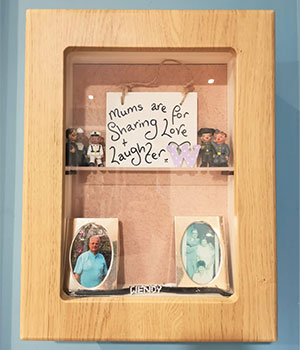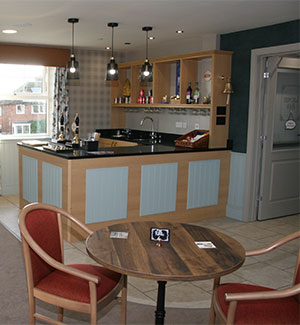According to figures from Alzheimer’s Society, over 70% of residents in care homes live with dementia or severe memory problems. One in six people over the age of 80 have dementia. A diagnosis of dementia can be one of the main factors that trigger families to search for a care home for a loved one.
At Country Court, our company motto is "Our family caring for yours" which is seen in practice every day in our care homes. We not only get to know each of our residents but their families too, equally they get to know each member of staff. Building bonds and relationships between staff and residents is key to meeting people’s needs and supporting them to have the best possible quality of life.
Good dementia care starts with getting to know people individually. Not only capturing people's medical details on admission but also talking to them about their likes, dislikes, preferences and wishes.
Our care teams work alongside families and friends to create a personal profile for each resident. A person’s ‘Life Story’ may be a booklet or more recently an electronic document that is ‘live’ and can be added to and updated at any time. This enables carers to record any changes to people’s preferred activities and add information that comes to light over the time that they are living in the home.
A resident may discover a love of painting or gardening that they never knew they had or respond positively to a particular song or style of music when they hear it played. This information is key to providing meaningful support for people to continue to live a happy and active lifestyle.

“Attention to detail is the key to creating good person-centred activities. It can be small details that make a big difference to someone’s day,” said Wellbeing coordinator Sharon Kinsella-Pullen at Eccleshare Court Care Home. “A resident may tell us that they like to watch TV in the afternoons but taking a moment to find out that they love quiz shows but hate soap operas means that they have a more meaningful interaction than just having the TV on in the background.”
Care Home Managers at Country Court are highly experienced professionals with an in-depth knowledge of dementia. Home Manager at Eccleshare Court Care & Nursing Home, Susannah Barker-Milan leads by example, showing staff how to take a welcoming approach, providing a safe and happy environment for residents.
Keen to share her knowledge and best practice, she has focussed on teaching staff about taking individual responsibility for residents’ care and educating them about person-centred dementia care. Good dementia care is in the ethos of Eccleshare Court. Residents without dementia are involved in supporting residents with dementia; from offering words of comfort to building up close connections and bonds. Residents take a genuine interest in each other, creating a warm, inclusive family atmosphere.

Robert Anderson a Foot Care Practitioner with The Fane Clinic is a regular visitor to Lakeview Lodge Care Home in Milton Keynes. He explains why taking the right approach to dealing with residents with dementia is so important:
“After a fairly long day, I had two very difficult patients, both of whom had spontaneous aggressive outbursts, interspersed with some lucidity and incoherent but highly audible speech. The usual activities lady wasn’t in, so the hospitality lady (Tilly) was bringing patients to me and these two were accompanied by a career called Kerry.
I have worked in specialised dementia homes for some five years now and have never witnessed a carer of this calibre. Throughout quite a difficult 30 or so minutes Kerry remained so calm and unfazed, she knew exactly how to curtail their aggressive outbursts and handled the situation in such a calming manner. Kerry knew the triggers of both patients and could almost foresee the behavioural changes. The standard of care at Lakeview is very good, I have always found those I have had interactions with to be genuinely nice and helpful, the way in which Kerry both conducted herself and handled the situation deserves some recognition.”

Carers such as Kerry, take a calm and thoughtful approach when interacting with residents. By being perceptive and utilising their dementia care training, staff can learn how to care for people with dignity and kindness. The Country Court staff awards are an opportunity for staff to nominate each other for demonstrating excellent care practices. Rewarding staff for displaying company values helps to retain caring and dedicated staff members.
Moving into a care home can often be a gradual process perhaps starting with a short respite stay leading to permanent residency. Families often wonder what to bring over and above the basics of clothing and toiletries.
“Our home is your home,” says Home Manager Karen Atillo at Beech Lodge “We encourage people to personalise their bedrooms with ornaments, pictures and photographs. Even soft furnishings like cushions or throws and blankets are useful. Familiar objects help people to settle more quickly and feel comfortable in their surroundings.”
“We use ‘memory boxes’ outside people’s rooms which include photos and small objects meaningful to them. The boxes provide visual clues to help people to orientate themselves when moving around the home and letting people know when they’ve arrived at their bedroom. We spend lots of time chatting with people’s families to find out about people’s lives and things that are important to them” Karen explained. “It’s good to have familiar topics to help start conversations with people. Equally, we need to know if there are certain things that may upset or confuse people so we can direct conversations away from those subjects”.

The facilities in care homes have come into their own during the pandemic. Customer Relations Advisor Morgan Hicks explains more, “Here at Fenchurch House, we have a superb range of facilities ideal for people living with dementia. During the lockdown, we’ve been able to have film nights in our cinema, make the most of the springtime sunshine by doing activities in the summer house in our garden and use the shop in our marketplace. The residents have benefitted from having different places to visit in and around the home.”
She added, “We’ve been able to give them a night out in the pub complete with a pub quiz and fish and chip supper. The change of scene can help lift the mood of those living with dementia, especially while we can’t go out of the home for day trips”.

Every detail has been thoughtfully considered in the décor of the care homes, with subtle colours and tones on flooring to reduce confusion. Hallucinations can be experienced in the middle or later stages of dementia and can lead to misinterpretation or misunderstanding the environment. Many elements of an interior layout or design could trigger a hallucination therefore the interior is carefully designed to avoid highly contrasting colours or patterns.
For more information about dementia care at Country Court, contact the Home Manager at your nearest Country Court Care Home.